1960s Movies Redux: 14 Reportedly Great Ones I Missed
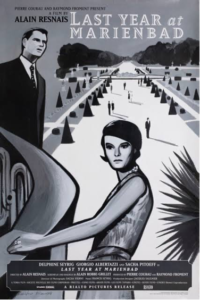
Last Year at Marienbad (1961)
Directed by Alain Resnais
Starring Delphine Seyrig, Giorgio Albertazzi, Sacha Pitoëff
Plot: In this mindbender of a romantic French drama, set in a picturesque château, a man, “X” (Giorgio Albertazzi), attempts to convince a woman, “A” (Delphine Seyrig), that they spent time together the previous year. But she has no memory of ever having met him. The question: Is there any truth to X’s story?
Reception: Rotten Tomatoes – 94% positive based on 53 reviews. “Elegantly enigmatic and dreamlike, this work of essential cinema features exquisite cinematography and an exploration of narrative still revisited by filmmakers today.”
Why it made my list: It was first recommended to me by HR, an older, pot-smoking cheerleader I had a crush on in high school. Why I never got around to watching it, I don’t know. But I’ll watch it this year in memory of her. (I heard she died a few years ago.)
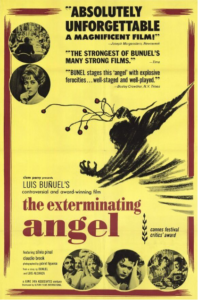
The Exterminating Angel (1962)
Directed by Luis Buñuel
Starring Silvia Pinal, Jaqueline Andere, Enrique Rambal
Plot: Members of Mexico City’s bourgeoisie come together for a lavish dinner party that soon unravels into nonsensical scenes of chaos as a mysterious force keeps them from leaving the room.
Reception: Rotten Tomatoes – 93% positive based on 27 reviews. “Societal etiquette devolves into depravity in Luis Buñuel’s existential comedy, effectively playing the absurdity of civilization for mordant laughs.”
Why it made my list: The phrase: “Societal etiquette devolves into depravity.”
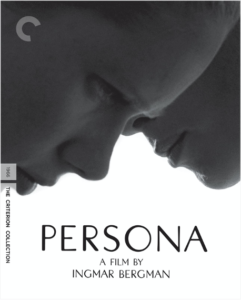
Persona (1966)
Directed by Ingmar Bergman
Starring Bibi Andersson, Liv Ullmann, Margaretha Krook
Plot: Alma (Bibi Andersson), a nurse at a psychiatric hospital, is assigned to a new patient, the famous actress Elisabet Vogler (Liv Ullmann), who has suddenly gone mute. As the women spend more time alone together, they form a powerful bond, with their personalities becoming more and more alike.
Reception: Rotten Tomatoes – 91% positive based on 54 reviews. “Arguably Bergman’s finest film, Personaexplores the human condition with intense curiosity, immense technical skill, and beguiling warmth.”
Why it made my list: In my teenage years, I did my best to love Bergman, but all I could do, at best, was admire him. Now that I’m so much older, I may feel differently – one way or the other. I’m eager to find out.
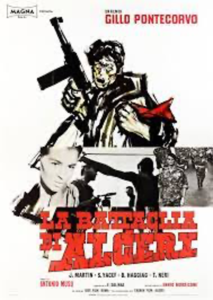
The Battle of Algiers (1966)
Directed by Gillo Pontecorvo
Starring Brahim Hadjadj, Jean Martin, Yacef Saadi
Plot: French Algeria in 1954 is the epicenter of the fight for Algerian independence. The film depicts the revolution from both sides, documenting the violence and fear that pervades the country.
Reception: Rotten Tomatoes – 99% positive based on 89 reviews. “A documentary-like depiction of a nation’s real-life efforts to expel a colonizing force, The Battle of Algiers puts viewers on the front lines with gripping realism.”
Why it made my list: I know very little about the Algerian revolution, but I heard a bit about it from French academics and mercenaries when I lived in Chad, a former French colony. I like the idea that this film shows the fight from both sides.
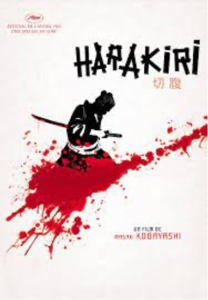
Harakiri (1962)
Directed by Masaki Kobayashi
Starring Tatsuya Nakadai, Akira Ishihama, Shima Iwashita
Plot: In 17th century Japan, a samurai, Hanshiro Tsugumo (Tatsuya Nakadai), arrives at the house of a feudal lord and asks for permission to commit harakiri (an honorable form of suicide) there. The lord tells Tsugumo the story of the last samurai who made that request and how it ended. Will he still go through with it?
Reception: Rotten Tomatoes – 100% positive based on 8 reviews. “Both a thrilling character piece and a scathing takedown of authority, Harakiri is a tour-de-force and a compelling look into the facade of institutions.”
Why it made my list: Kobayasshi is considered one of the great Japanese directors, and this is said to be his masterpiece. The Japanese made some great films in the 1960s. How can it not be on my list?
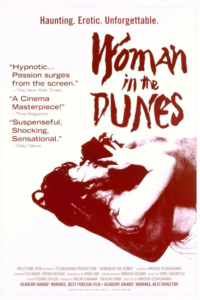
Woman in the Dunes (1964)
Directed by Hiroshi Teshigahara
Starring Eiji Okada, Kyôko Kishida, Hiroko Itô
Plot: An entomologist, Jumpei Niki (Eiji Okada), who is collecting insects in a rural seaside village is tricked into living with a mysterious woman who spends almost all her time trying to keep her home from being swallowed up by advancing sand dunes. The two begin a bizzare and erotic relationship that stretches over years, while Jumpei’s hope for escape dims.
Reception: Rotten Tomatoes – 100% positive based on 29 reviews. “An important contribution to the avant-garde, this existential thriller offers an allegorical take on the cruel and twisted universe in which we live.”
Why it made my list: Japanese classic + 1960s avant-garde + existential + thriller = bound to please at some level.
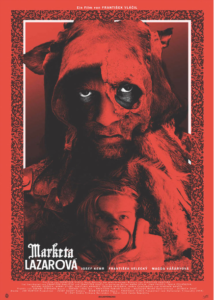
Marketa Lazarová (1967)
Directed by Frantisek Vlácil
Starring Josef Kemr, Magda Vásáryová, Nada Hejna
Plot: Set in the 13th century, the film tells the story of a young virgin, the daughter of a feudal lord. When she is kidnapped by a clan of bandits pillaging the village and forced to marry one of them, her father seeks revenge.
Reception: Rotten Tomatoes – 100% positive based on 12 reviews. “Its eerie, haunting music, gorgeous cinematography from Bedrich Batka, and Miroslav Hajek’s editing make for one of the most magical cinematic assaults on the senses. It’ll razzle dazzle you.”
Why it made my list: I’m weak on my knowledge of Czech films, always in the mood for “gorgeous cinematography,” and haven’t seen a good pillaging movie in ages. Why not?
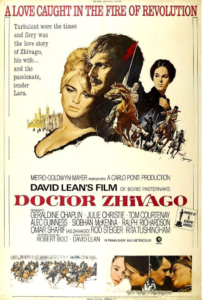
Doctor Zhivago (1965)
Directed by David Lean
Starring Omar Sharif, Julie Christie, Geraldine Chaplin
Plot: This sprawling romantic epic depicts the struggles of surgeon and poet Dr. Yuri Zhivago (Omar Sharif) during World War I, the Russian Revolution of 1917, and the Russian Civil War.
Reception: Rotten Tomatoes – 84% positive based on 50 reviews. “Despite the grim and brooding background, Zhivago has a surging buoyant spirit that is unquenchable. Doctor Zhivago is more than a masterful motion picture; it is a life experience.”
Why it made my list: Duh. Never saw it!
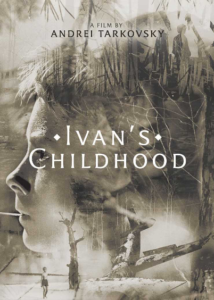
Ivan’s Childhood (1962)
Directed by Andrei Tarkovsky
Starring Nikolay Burlyaev, Valentin Zubkov, Evgeniy Zharikov
Plot: 12-year-old orphan Ivan Bondarev (Nikolay Burlyaev) works as a spy on the Eastern front during WWII. An unlikely friendship forms between Ivan and three Soviet officers.
Reception: Rotten Tomatoes – 100% positive based on 24 reviews. “Remains one of the most remarkable debuts in all of cinema, and one of the most indelible portraits of war and childhood ever made.”
Why it made my list: “Remains one of the most remarkable debuts in all of cinema, and one of the most indelible portraits of war and childhood ever made.”
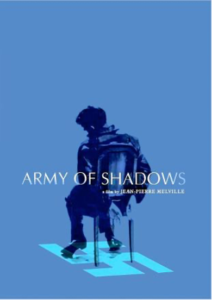
Army of Shadows (1969)
Directed by Jean-Pierre Melville
Starring Lino Ventura, Paul Meurisse, Jean-Pierre Cassel
Plot: In 1942, Philippe Gerbier (Lino Ventura), a leader of the French Resistance, is arrested and sent to a concentration camp. He manages to escape, rejoin the underground, and take revenge on the informant who betrayed him.
Reception: Rotten Tomatoes – 97% positive based on 75 reviews. “The greatness of Army of Shadows comes from the way it is able to convey many of the cruel paradoxes of war. What is an intimate and messy affair for some ends up being a remote and tactical exercise for others.”
Why it made my list: Honestly? I was sold by the title.
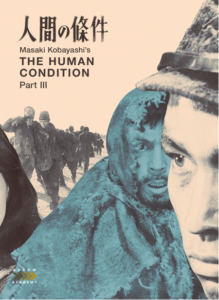
The Human Condition III: A Soldier’s Prayer (1961)
Directed by Masaki Kobayashi
Starring Tatsuya Nakadai, Michiyo Aratama, Tamao Nakamura
Plot: Adapted from Junpei Gomikawa’s six-volume novel, The Human Condition trilogy follows the life of a pacifist, Kaji (Tatsuya Nakadai), in war-time Japan’s military. In the final part of the trilogy, trying to rise above a corrupt system, Kaji time and again finds his morals an impediment rather than an advantage.
Reception: Rotten Tomatoes – 97% positive based on 500+ audience reviews. “The film possesses a restless vitality, with hard cuts juxtaposing abject brutality with pastoral tranquility and romantic longing.”
Why it made my list: It almost didn’t. The subject matter is heavy. The review made the treatment sound daunting. I’m thinking this is going to take some energy to go through. But with 485 positive reviews out of 500, I owe it to myself to give it a go.
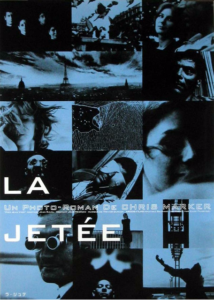
La Jetée (1962)
Directed by Chris Marker
Starring Étienne Becker, Jean Négroni (voice), Hélène Châtelain
Plot: Told mostly through a series of photos with voice-over narration, La Jetée is the story of a man in post-World War III Paris who is sent back in time in order to find a cure for the devastation faced by people in the present.
Reception: Rotten Tomatoes – 93% positive based on 27 reviews. “La Jetée pioneers new storytelling possibilities by shaving an ambitious science-fiction narrative down to its bare essentials, achieving a transporting texture with each still frame.”
Why it made my list: Another one that sounds like work. Film-student work. But I’m a student of film. Maybe I’ll like it.
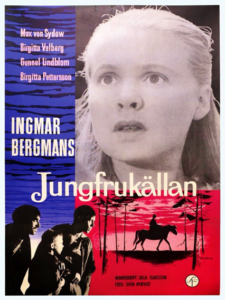
The Virgin Spring (1960)
Directed by Ingmar Bergman
Starring Max von Sydow, Birgitta Valberg, Gunnel Lindblom
Plot: Set in 14th century Sweden, Karin (Birgitta Valberg), the beautiful daughter of a Christian landowner, is sent to deliver candles to a distant church, accompanied by the family’s servant, Ingeri (Gunnel Lindblom). Along the way, they have a shocking encounter with a group of savage goat herders… and only one of the girls returns home.
Reception: Rotten Tomatoes – 87% positive based on 23 reviews. “The Virgin Spring marks one of Ingmar Bergman’s most controversial dramas, although its uncomfortable exploration of divine justice – or lack thereof – is undeniably thought-provoking.”
Why it made my list: I think I might have seen this one. I can’t remember. If it’s the movie I’m remembering, it is grim, stark, and ultimately depressing. My good friend Ken Danz used to say, “If it’s described as grim, stark, and depressing, I know I’m going to like it.” I’ll be watching this in memory of Ken.
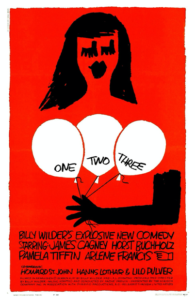
One, Two, Three (1961)
Directed by Billy Wilder
Starring James Cagney, Horst Buchholz, Pamela Tiffin
Plot: Hoping that it will get him a promotion, C.R. MacNamara (James Cagney), a minor executive in Coca Cola’s West Berlin branch, takes on the job of looking after his boss’s socialite daughter when she visits the city.
Reception: Rotten Tomatoes – 91% positive based on 22 reviews. “Billy Wilder’s One, Two, Three is an uproarious Cold War satire, offering devastating critiques of both factions with an effortless touch and a powerhouse performance from James Cagney.”
Why it made my list: I haven’t seen many Billy Wilder films, but I know that he’s considered to be important. I like satire. And James Cagney? I’m in.
